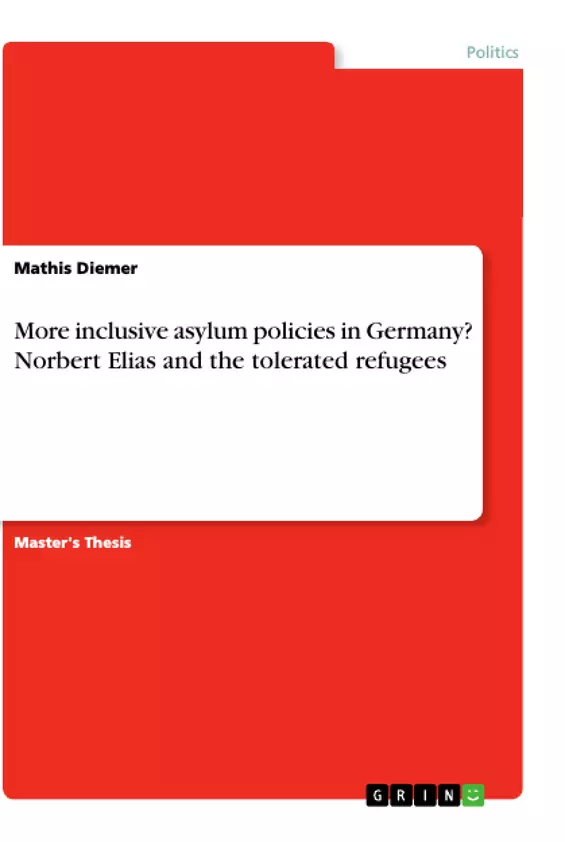This thesis aims at pointing out that currently in Germany a multidimensional form of exclusion of asylum seekers is taking place. On the one hand, this exclusion exists by using right-wing populist rhetoric in political discourse (first dimension). On the other, there are legislative provisions in the German asylum system which impede an adequate social inclusion of many asylum seekers with a lasting effect (second dimension). These exclusion mechanisms are of particular concern to "illegalized" migrants.
In this context, three hypotheses will be examined. The first hypothesis is: "Asylum seekers in Germany are systematically marginalized and stigmatized in political discourse by the right-wing populist rhetoric by political players such as Pegida, AfD, and CSU." The second hypothesis is: "Because of the different types of residence within the German asylum system and the related legal consequences, illegalized and "tolerated" asylum seekers are socially marginalized." The third hypothesis is: "An inclusive asylum policy can help overcome the social marginalization and stigmatization of illegalized and "tolerated" refugees."
Inhaltsverzeichnis (Table of Contents)
- Introduction
- Methodology
- Relevance and current state of research
- Elias and Scotson's "established – outsiders figuration"
- Power relationships
- Established - outsiders relations
- Sources of power
- Stigmatization as an instrument of power
- Criticism
- Marginalization and stigmatization of asylum seekers in political discourse
- Right-wing populism
- Pegida
- Alternative für Deutschland
- Christlich-Soziale Union
- Discrimination by law?
- Institutional discrimination
- The types of residence in the German asylum system
- Marginalization by law?
- The concept of inclusion
- Inclusion vs. exclusion
- Elements of inclusive asylum policies an approach
- Conclusion
Zielsetzung und Themenschwerpunkte (Objectives and Key Themes)
This thesis examines the multifaceted exclusion of asylum seekers in Germany, focusing on both the use of right-wing populist rhetoric in political discourse and the restrictive provisions within the German asylum system. It aims to analyze how these factors contribute to the social marginalization of "illegalized" migrants and explore the potential of inclusive asylum policies in addressing these challenges.
- The role of right-wing populism and its rhetoric in marginalizing asylum seekers in Germany.
- The impact of the German asylum system's legal framework on the social integration of asylum seekers, particularly those categorized as "illegalized" or "tolerated."
- The concept of inclusive asylum policies and its potential in addressing the social exclusion and stigmatization of asylum seekers.
- The relationship between power dynamics, stigmatization, and the marginalization of asylum seekers in Germany.
- The use of Elias and Scotson's "established-outsiders figuration" framework to analyze the power dynamics and social exclusion experienced by asylum seekers.
Zusammenfassung der Kapitel (Chapter Summaries)
The introduction provides an overview of the global refugee crisis, highlighting the challenges faced by Germany in managing the influx of asylum seekers. It also introduces the concept of "welcome culture" and its contradictions in the German context. The chapter discusses the methodology used in the research and the relevance of the topic.
Chapter 2 explores the theoretical framework used in the thesis, specifically the "established-outsiders figuration" developed by Elias and Scotson. This framework helps to understand the power dynamics and social exclusion experienced by asylum seekers.
Chapter 3 analyzes the use of right-wing populist rhetoric in marginalizing asylum seekers in political discourse. It examines the role of parties like Pegida, AfD, and CSU in shaping public perceptions and contributing to the stigmatization of refugees.
Chapter 4 investigates the legal framework of the German asylum system and its impact on the social integration of asylum seekers. It examines the different types of residence permits and the legal consequences associated with each category, highlighting how the system can contribute to the marginalization of "illegalized" migrants.
Chapter 5 explores the concept of inclusive asylum policies and its potential in addressing the social exclusion and stigmatization of asylum seekers. It examines the key elements of inclusive policies and proposes an approach for creating a more welcoming and integrated environment for refugees.
Schlüsselwörter (Keywords)
This thesis focuses on the themes of asylum, integration, exclusion, right-wing populism, institutional discrimination, social marginalization, stigmatization, inclusive asylum policies, and the theoretical framework of Elias and Scotson's "established-outsiders figuration." It analyzes the German context through the lens of power dynamics, legal frameworks, and the impact of political discourse on the experiences of asylum seekers.
Frequently Asked Questions
What is the "established-outsiders figuration" by Norbert Elias?
It is a theoretical framework used to analyze power dynamics and social exclusion, where the "established" group uses stigmatization to maintain power over "outsiders."
How are asylum seekers marginalized in German political discourse?
The thesis argues that right-wing populist rhetoric from groups like Pegida, AfD, and CSU systematically stigmatizes and marginalizes refugees.
What is "institutional discrimination" in the German asylum system?
It refers to legislative provisions and different types of residence permits (like "tolerated" status) that legally impede the social inclusion of migrants.
Can inclusive asylum policies reduce stigmatization?
Yes, the thesis examines the hypothesis that a more inclusive policy approach can help overcome the social marginalization of "illegalized" refugees.
What is the relevance of the "welcome culture" in this study?
The study explores the contradictions of the German "Willkommenskultur" against the backdrop of systemic exclusion and populist backlash.
- Arbeit zitieren
- Mathis Diemer (Autor:in), 2015, More inclusive asylum policies in Germany? Norbert Elias and the tolerated refugees, München, GRIN Verlag, https://www.grin.com/document/942845



